11 Free Online Coding Classes [2022 Beginner Guide] was originally published on Springboard.
As the tech industry continues to boom and software engineers and developers remain in high demand—the Bureau of Labor Statistics forecasts that software development roles will grow by 28% between now and 2028, far exceeding the projected 5% rate of growth for all other occupations—so too has demand for coding classes.
The education industry has risen to meet that demand, offering programs that range from comprehensive mentor-supported classes that charge tuition, to subscription-based massive open online courses (MOOCS), to free classes that are open to everyone. And while paid courses typically offer students a more well-rounded learning experience and benefits such as personalized mentoring, job guarantees, etc. there are many reasons free courses are compelling: they present a low barrier to entry; they give students a taste of what it takes to become a software engineer or developer with no capital investment, and they can help lay foundational coding knowledge to prepare students for more advanced courses and bootcamps.
Read on to learn more about the different types of free online coding courses and how to get the most out of them.
Are Free Coding Courses Worth It?

Whether a free coding course is worth your time depends on what you’re looking for. Are you a complete beginner who is learning a programming language from scratch? Do you only want to learn a programming language or do you want it taught in the context of a profession? How important to you is receiving feedback from instructors, or interactions with peers in the form of portfolio reviews, collaboration, and accountability?
If you find a course that aligns with your needs and you are willing to put in the work, then a free coding course can be a valuable way to learn the basics, bridge the skills gap, and prepare for more advanced coding challenges.
Best Free Online Coding Classes
Not all free coding courses are made equal, and whether you’ll enjoy a course will depend on your existing knowledge and experience, learning style, and what you hope to get out of a class. Below are 11 free courses that have helped aspiring software programmers learn to code.
Beginner’s Guide To Front-End Programming
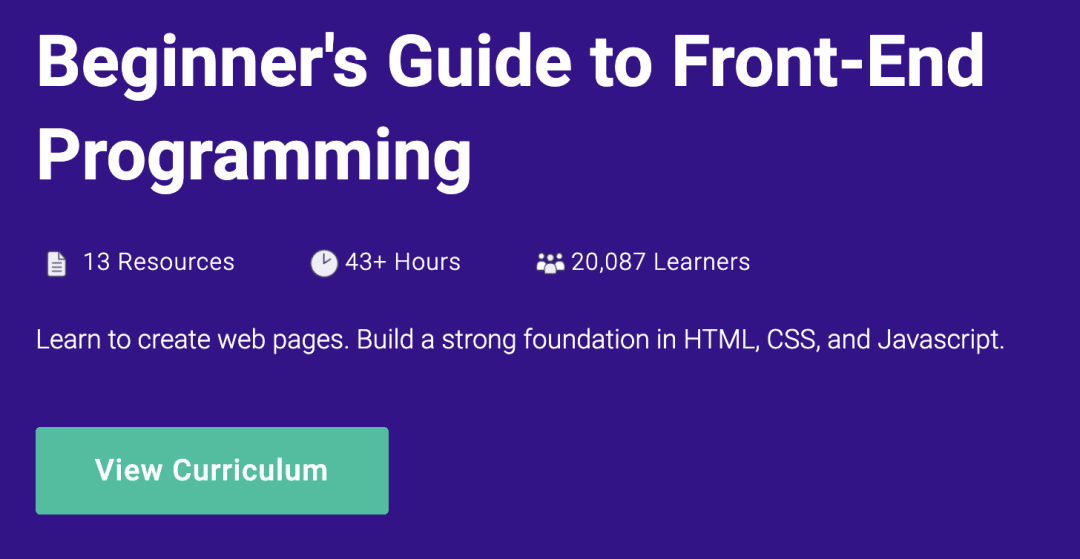
An online crash course in front-end web development taught by Springboard, this free class comprises 43 hours of content that will equip complete beginners with the tools to venture into web development.
What We Like
Springboard’s course helps build a strong foundation in front-end development programming languages such as HTML, CSS, and Javascript. It also contextualizes these languages within the front-end development profession, touching on interactive design, user interfaces, HTML5, and UX fundamentals.
Who it’s for
This course is suitable for both complete beginners who have no prior programming experience, and for those who know some coding but are new to front-end development.
Codeacademy
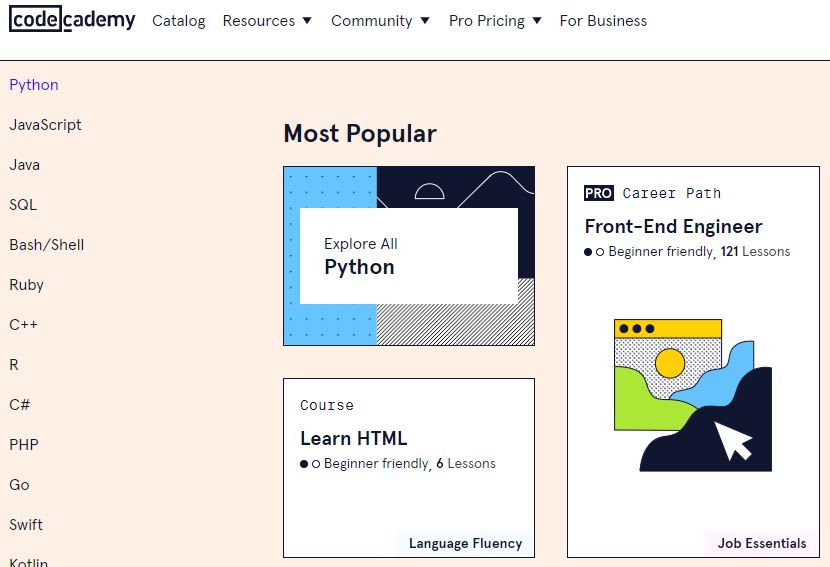
Many of Codeacademy’s career-centric courses are locked behind a paywall, but its beginner-friendly programming courses, which span more than a dozen languages, are free.
What We Like
If you want to dip your toes into learning programming languages, Codeacademy offers its most basic introductory courses free of charge. It also offers classes on a wide range of programming languages, including HTML/CSS, Python, SQL, C++, Ruby, R, Javascript, and PHP.
Who It’s For
Codeacademy’s free courses are designed for complete beginners who want to get a handle on the basics of programming.
aGupieWare

In this blog post from aGupieWare, the author attempts to recreate a bachelor’s-level computer science curriculum using only free and existing classes offered by higher education institutions such as MIT, Stanford, Carnegie Mellon, the University of New South Wales, and UC Berkeley.
What We Like
aGupieWare’s curriculum mimics that of a bachelor’s degree program by piecing together free courses taught by various colleges, thus replicating the degree experience at no cost. Courses are organized by whether they’re introductory in nature, core courses, or electives.
Who It’s For
This curriculum is designed for anyone who wants to take college courses and follow the structure of a traditional degree program. It is ideal for anyone who wants to learn about computer science holistically, instead of learning just the specific skills required for software engineering/development. Students who complete the curriculum will not receive any certifications, though—this “course” is informal.
freeCodeCamp
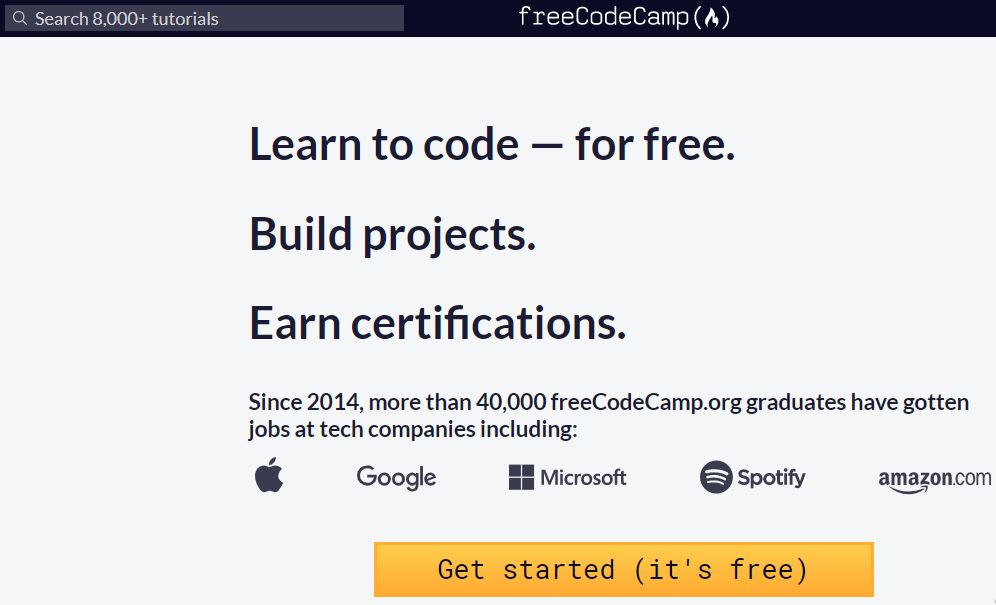
Boasting more than 8,000 tutorials, freeCodeCamp is designed to get students coding from the first lesson. Each tutorial is presented in a split-screen where a concept is explained on the left and an interactive coding tool is available on the right, which allows students to see their code in action. Classes are available across topics such as responsive web design, front-end, and back-end web development, data analysis with Python, information architecture, and machine learning.
What We Like
The interactive nature of freeCodeCamp’s courses means that students get ample practice with coding and can put the things they learn into practice right away. The free program also offers certifications that graduates can put on their resume.
Who It’s For
The programs are designed so that complete beginners can follow along if they start from the beginning and go in the recommended order.
Introduction to Computer Science and Programming
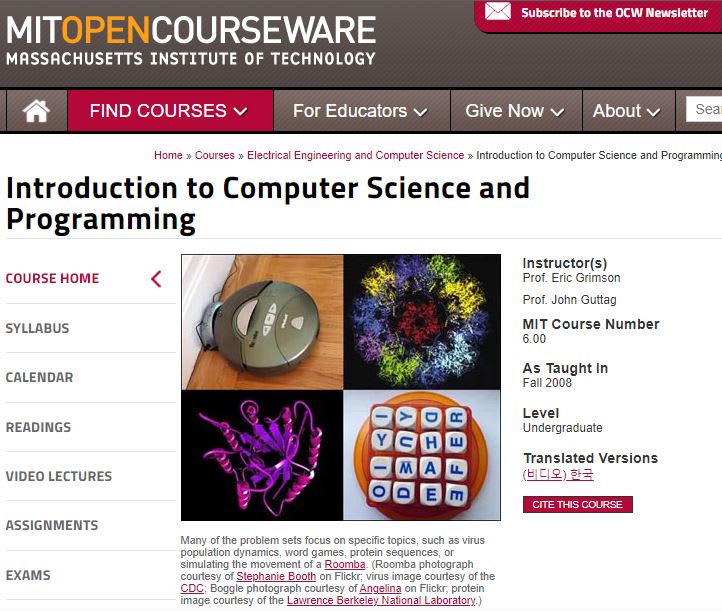
In this introduction to Python programming taught by MIT, students receive hands-off instruction in the form of video lectures, readings, and ungraded exams with solutions provided.
What We Like
Students get access to the same course materials as those taking an in-person class at MIT, from pre-recorded lectures to readings, assignments, and exams. On completion, students should be able to write small programs and understand the role of computation in solving problems.
Who It’s For
This course is suitable for complete beginners with little or no programming experience, although independent learners who don’t need instructor support will likely get the most out of it.
Computer Programming by Khan Academy
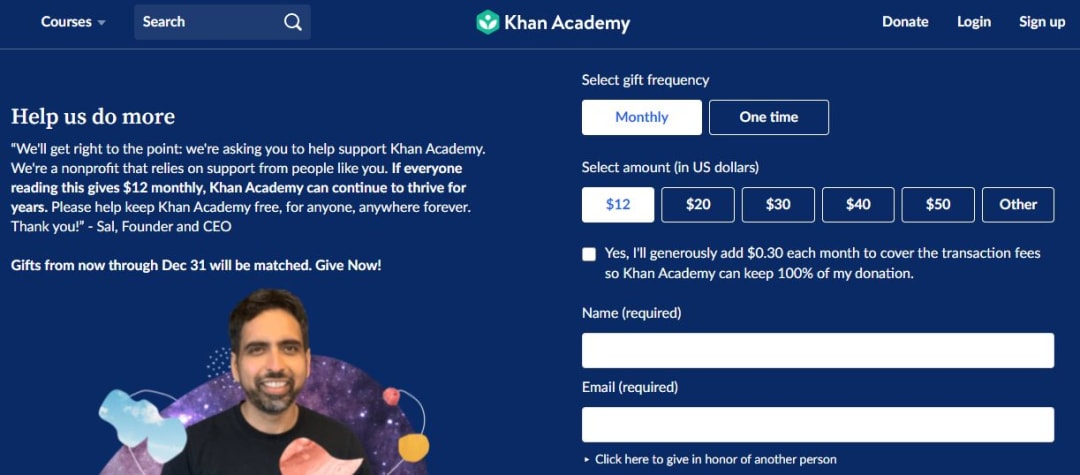
Although most of Khan Academy’s courses are targeted at a younger audience, with much of its content geared toward grade schoolers and those preparing for college admissions exams, its computer science course covers a lot of ground in an easy-to-follow and accessible way.
What We Like
Khan Academy has mastered the creation of courses so accessible and easy to understand that even young children can follow along. This is particularly useful for computer programming, which can be challenging to learn, especially for anyone who doesn’t have coding experience. Its lessons cover everything from HTML and CSS to jQuery techniques and designing interactions.
Who It’s For
Many of the exercises in this course might seem rudimentary and aimed at children (E.g. drawing a face on a funky frog), but for anyone who is a complete beginner and finds other introductory courses intimidating, Khan Academy offers a gentle ramp up from introductory concepts to more advanced techniques.
Code With Google

With step-by-step videos and a beginner coding app, Code with Google offers courses that are suitable for children and adults across subjects ranging from introductory computational principles to machine learning basics.
What We Like
Code with Google breaks down computer science concepts into bite-sized chunks by explaining them in short videos, engaging students in starter projects, and eventually teaching them Javascript.
Who It’s For
Most of Google’s introductory courses are aimed at grade school students, although this doesn’t preclude adults from taking part. The classes are all self-paced, with the more advanced courses—such as its crash course in machine learning—designed for those who have some prerequisite knowledge in variables, linear algebra, and logarithms.
Code.org
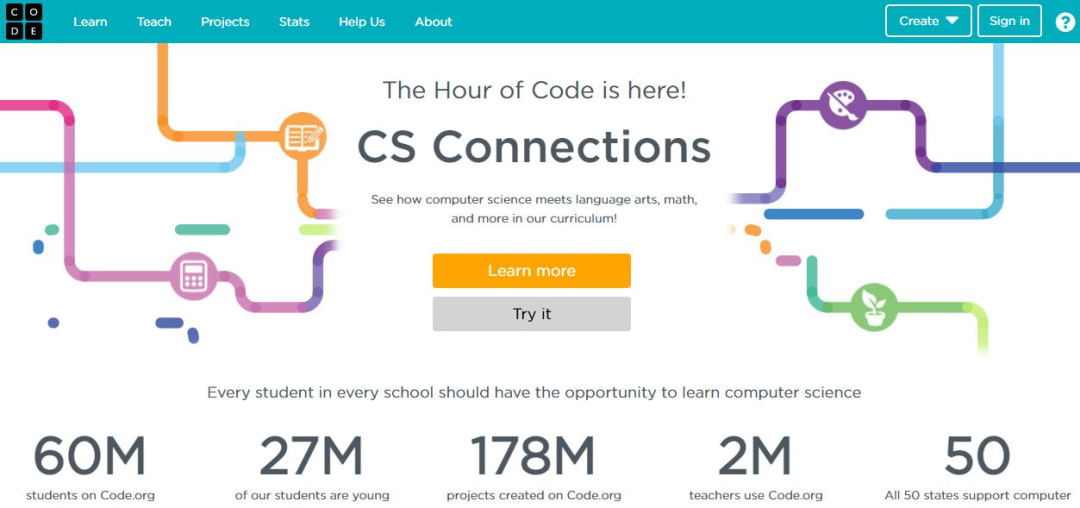
Similar to Khan Academy and Code for Google, Code.org’s introductory courses are designed for grade schoolers. But if you don’t mind the child-friendly activities (E.g. drag and drop blocks, drawing, games), it offers accessible lessons in computer science principles, HTML, and CSS.
What We Like
Code.org teaches many of its computer science principles through video games and kid-friendly exercises. For example, students are taught to code their way out of problems through the game Minecraft or to program a dance party using coding blocks.
Who It’s For
Code.org is best suited to grade schoolers because most of its activities are designed to engage children. The lessons do not dive into the nitty-gritty of software engineering or web development.
CodeCombat
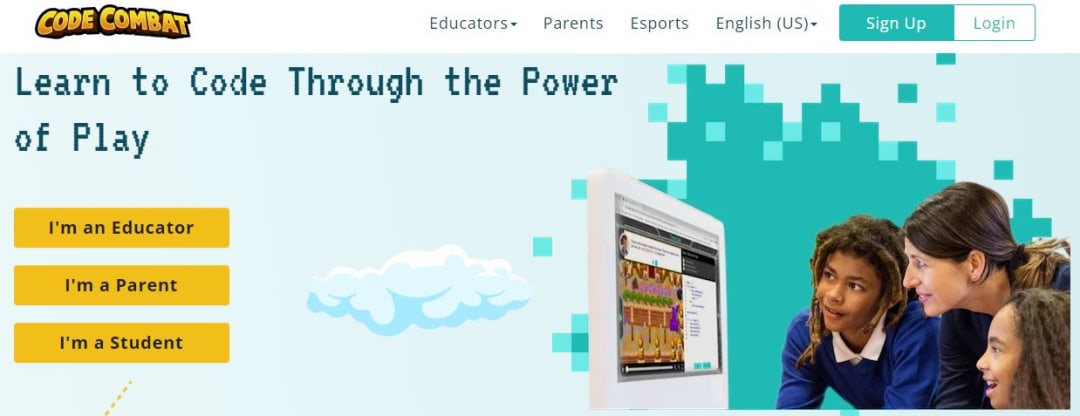
Specializing in game-based learning, CodeCombat teaches Python, Javascript, and C++ in beginner-friendly terms. Students type real Python and Javascript code while playing a game and receive individualized attention from instructors.
What We Like
Although students are learning through playing a game, the concepts covered are vast. Beginners will learn sequences, algorithms, syntaxes, strings, loops, and variables. More advanced students will learn about boolean logic, advanced loops, functions, and basic game AI. And students with prior coding experience can learn about arrays, stacks and queues, advanced strings, functions and returns, and recursions.
Who It’s For
CodeCombat is designed for children and is recommended for those aged 7-16.
Free Intro to Coding
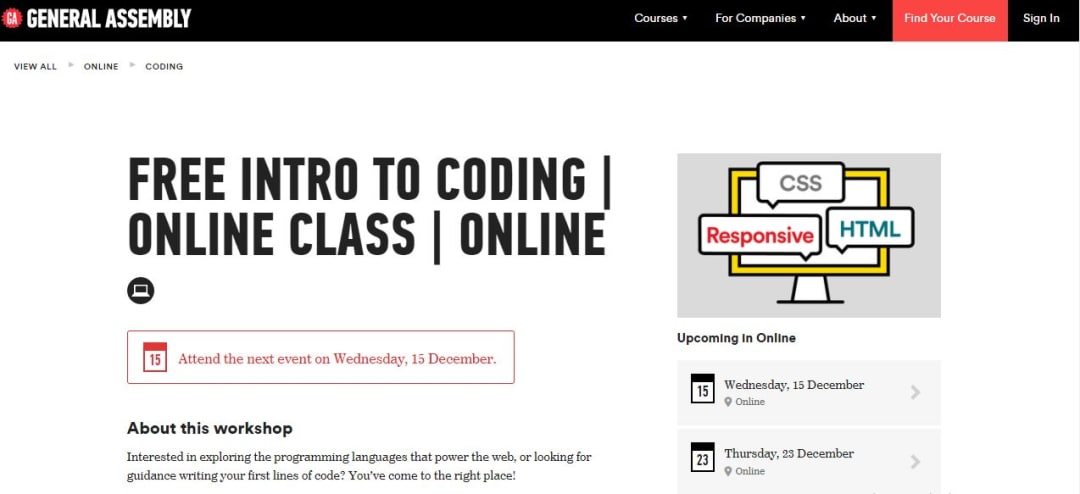
In this two-hour synchronous live stream taught by General Assembly, students learn the basics of HTML and CSS from local industry professionals and can ask live questions in a real-time Q&A.
What We Like
The synchronous nature of the class and optional Q&A means students can ask questions, interact with classmates, and get a quick taste of the work required to become a fluent programmer.
Who It’s For
For anyone who truly wants a quick introduction to coding so that they can decide whether they want to commit additional time and resources to it, General Assembly’s introductory course is a low-stakes and low-commitment way of learning what HTML and CSS coding is about.
Codeop
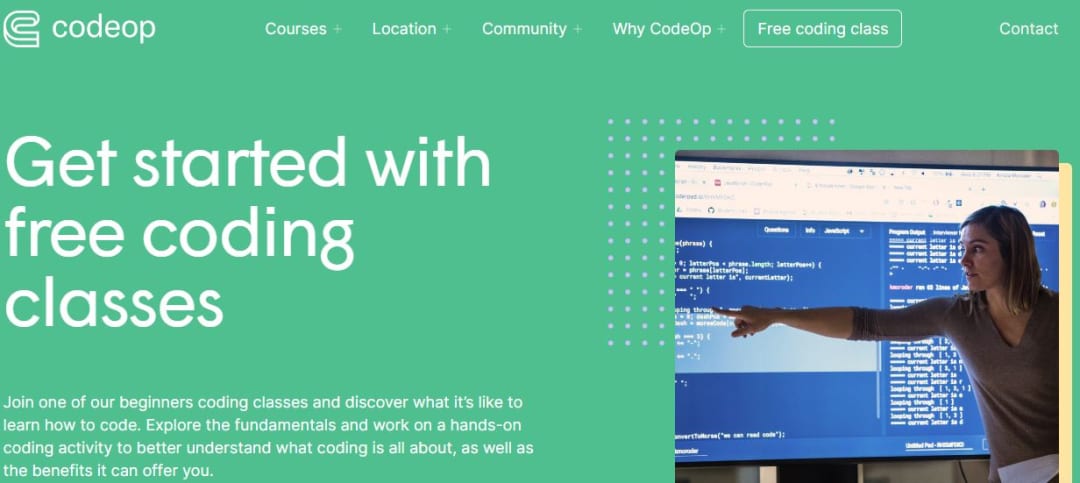
Codeop offers paid in-person and remote courses in full-stack development, data science, and product management, but it also teaches free, real-time introductory courses to coding.
What We Like
Codeop’s free classes are a great way to get a taste of coding fundamentals. Each workshop runs for 1.5 hours and gives students the opportunity to tune into a lecture, get hands-on time with coding basics, and ask questions during a Q&A session.
Who It’s For
The course is geared toward anyone interested in learning to code but unsure whether they should pursue it. Similar to General Assembly, Codeop’s free class offers a taste of its longer paid courses. Instructors are also present to answer any questions students may have, from how to get started to the types of opportunities that open up when a person knows how to code.
Making the Most Out of a Free Coding Course
The key to getting the most out of a free coding course is choosing a program that best fits your needs. For example, if you want a holistic education in front-end web development, then enrolling in a course that only teaches a single programming language might leave you dissatisfied. Likewise, if you want to go in-depth with Python or Javascript, then courses geared toward grade schoolers might not help you achieve your goals.
How Do Coding Courses Work?
Coding courses typically fall into one of two buckets: synchronous and asynchronous. Synchronous courses take place in real-time and require students to be logged on during specific hours to participate in classes. Codeop’s free coding class, for example, is synchronous. The vast majority of coding classes are asynchronous, with classes delivered via pre-recorded video lectures, readings, and activities. This allows students to go at their own pace.
Free courses usually do not offer as much, if any, instructor support as paid courses, and community support (i.e. message boards, opportunities to interact with peers, Q&As with instructors) can vary from platform to platform.
What Should You Expect To Learn During a Free Coding Course?
Most free online courses have a curriculum detailing what will be taught. For example, a course dedicated to front-end web development might teach HTML, CSS, and Javascript, in addition to UI design concepts such as prototypes, wireframing, interface design, and design thinking. A Python-focused course might only teach students how to code in that specific programming language. And a course designed for children might help students understand basic computer science concepts, but not teach any hard coding skills or help students build a portfolio.
Before enrolling in any course, it’s important to check the outcomes of the program—upon course completion, what skills do graduates develop? How advanced are the skills? In what ways can the skills be used in the workforce?
What Will the Schedule Look Like?

Unlike synchronous paid courses, which often require a full-time or part-time commitment, free asynchronous courses usually allow students to go at their own pace, with no time limitations.
How Do You Choose a Free Online Coding Course?
There are a number of factors to consider when choosing a free online coding course.
Curriculum
Before enrolling in a course, research what the curriculum covers and see whether it aligns with what you need. Are you a complete beginner who just wants to get a taste of a coding workshop? In that case, a short introductory course that’s broad in nature might be perfect for you. Are you someone who wants to retrain for a career in software development? Then you’ll want to look for a comprehensive and holistic program that teaches everything from programming basics to workplace applications and soft skills training. Or are you someone who is looking to fill a narrow skills gap? In that case, a hyper-focused course is probably the best fit.
Instructors

When deciding between courses, it’s worth checking to see who will be teaching the course. Will you be taught by industry professionals? Do the instructors have office hours so you can check in to ask questions? Do they offer guidance? And, in the event that you get stuck, is there a tutor network to help you with coursework? Again, seriously think about what you want to get out of a free online course because this will determine the importance of the type of instructor you get.
Support
Online courses—both free and paid—vary in the amount of support they offer students. Consider your learning style and the kind of support you might need. Are you someone who can learn on your own? Or will you want the support of mentors and career coaches? Some free online programs offer support in the form of message boards, which allow students to support each other.
Reputation
The number of free online courses available can be overwhelming. When deciding between courses that look similar, you can differentiate between them based on reputation. How well-known is the online school or bootcamp? Who is in their alumni network? What information is available about graduate job placement or salaries? Do they offer job guarantees? Look for schools that offer transparency.
FAQs About Free Coding Classes

Still have questions about free coding classes? We answer some of the most commonly asked questions below.
How Hard Is It To Learn Coding?
Anyone can learn to code. Like any skill, learning to code requires persistence and dedication, and learning to write code for complex programs will require deeper knowledge and more experience than writing code for basic functions. Still, those who are willing to put in the work can usually learn to code within a few months, regardless of whether they have prior computer science experience.
Can You Learn Coding for Free?
Yes, you can learn coding for free. Many free online courses teach everything from programming basics to writing machine learning algorithms. The real question is whether a free online coding course suits your learning style. Consider whether you enjoy cobbling together disparate resources to learn on your own, or if you prefer instructor support, mentorship, and career guidance. These are things worth considering when choosing a course.
When Should You Take an Online Coding Course?
Free online coding courses can be great resources for anyone who is interested in learning to code but is unsure of what it entails. They can also be immensely useful for those who want to learn coding basics before enrolling in a more advanced course, or those who are already experienced coders looking to fill a knowledge gap.
Do Companies Value Free Coding Certificates?
Free coding certificates can be useful, although most hiring managers at larger organizations typically value evidence of your coding skills in action over a certification. For many recruiters, a coding certificate won’t be enough to land a job in software development, engineering, or data science; to impress future employers, you’ll want to put your learned coding skills to work by creating a portfolio that sets you apart from the competition.
Ready to switch careers to software engineering?
Springboard offers a comprehensive software engineering bootcamp. You’ll work with a one-on-one mentor to learn key aspects of front-end web development, back-end web development, databases, and data structures and algorithms. Modules include learning resources, practice exercises, projects, and career-related coursework.
Check out Springboard’s Software Engineering Career Track to see if you qualify.
Not quite ready to dive into a software engineering bootcamp
Springboard also offers a Software Engineering Prep Course, where you can learn the foundational web development skills (HTML, CSS, and JavaScript) needed to pass the technical skills survey for the Software Engineering Career Track.
The post 11 Free Online Coding Classes [2022 Beginner Guide] appeared first on Springboard Blog.



